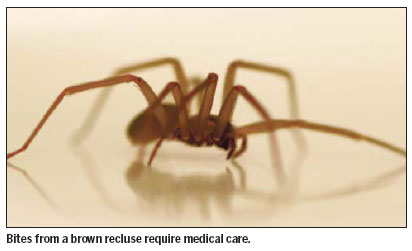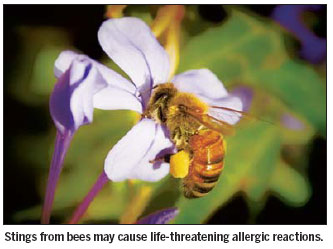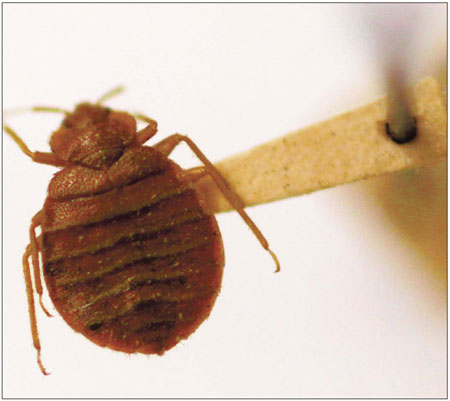Health
Stung into action
Updated: 2011-04-13 07:55
(China Daily)
|
Bedbugs, the latest headline-maker in the United States, are famously hard to eradicate. Photos by Carolyn Kaster / AP |


 |
Spring has sprung and this is the time of year that bugs emerge to bite and sting. Here's how to deal with those irritating itches and welts.
It's that time of year when bugs emerge to bug us. Some can pose real threats ?Lyme disease from tiny ticks, West Nile virus from mosquitoes, or life-threatening allergic reactions to bee stings. But most bug bites are an itchy nuisance.
How itchy or big the welt depends in part on your own skin, how much of the chemical histamine it harbors. Yes, some people really are mosquito magnets. And no, most of the bites people blame on spiders aren't from them at all.
In fact, chances are you won't be able to tell the culprit unless you catch it in the act. Yet doctors and entomologists alike field calls asking, "What bit me?"
"People call up really bummed out," says spider expert Jonathan Coddington of the Smithsonian Institution's National Museum of Natural History, who points to just two worrisome types, the black widow and brown recluse family. Spider phobia, he says, is "out of all proportion to actual risk".
It's not uncommon to have a large skin reaction to any bite or sting, says Dr Reid Blackwelder, a family physician from East Tennessee State University, who sees a couple of them a week in the early spring and summer.
"Most of the time, what people need is reassurance," he says.
Mosquito bites probably are the most common. Sure we've been told to watch out for them at dusk and dawn. But the Asian tiger mosquito bites all day long. It's an aggressive, harder-to-swat version, Coddington says.
If it seems every mosquito's after you, well, there are about 3,500 species around the world and Coddington says most don't bite humans, preferring other animals instead. But those who do can be attracted by sweat, alcohol, perfumes and dark clothing.
Bedbugs are the latest headline-maker. Scientists can't explain why they've suddenly rebounded in many US cities after all but vanishing in the 1940s and 50s. But once they're in a building, they're famously hard to eradicate. You won't feel their needle-like bite, but you might see a line of red dots in the morning.
Not so with horse flies and black flies. They cause painful welts, and they'll chase any blood meal. And yellow jackets may be a bane of summer picnics, but they're most aggressive in the fall, the reproductive mating season, Coddington notes.
Most people face no risk other than infection from scratching, but there are some important exceptions:
Ticks
Blacklegged tick species, commonly called deer ticks, that are as small as poppy seeds can transmit Lyme disease. The Centers for Disease Control and Prevention (CDC) counted more than 35,000 confirmed or probable cases of Lyme in 2009, the latest data available. These ticks are most active from May through July.
If a tick has been biting for less than 24 hours, chances of infection are small. So do a daily tick check. The CDC recommends using insect repellent with DEET.
Antibiotics easily cure most people of Lyme. But other than Lyme's hallmark round, red rash, early symptoms are vague and flu-like. People who aren't treated can develop arthritis, meningitis and some other serious illnesses.
Different tick species around the country can transmit additional diseases, such as Rocky Mountain spotted fever, tickborne relapsing fever, and STARI or Southern tick-associated rash illness.
Mosquitoes
West Nile virus is the main mosquito concern in the US. Although cases have dropped in the last decade, the CDC recorded 45 deaths from West Nile in 2010. Severe symptoms fortunately are rare but include high fever, neck stiffness, disorientation, coma, muscle weakness and paralysis, and the neurological effects sometimes are permanent.
To avoid mosquitoes, the CDC advises wearing insect repellent containing DEET, picaridin or oil of lemon eucalyptus. Empty standing water where mosquitoes breed.
While there are no known cases of West Nile infections in China, experts warn against the risks posed by mosquitoes as summer approaches.
Bees
At least 40 people a year die from allergic reactions to stings from bees or other insects, according to the American Academy of Allergy, Asthma & Immunology. Potentially life-threatening reactions occur in fewer than 1 percent of children and 3 percent of adults.
But seek care quickly for signs of an emergency, Blackwelder stresses: Swelling on the face or neck, shortness of breath or feeling dizzy. People who know they're allergic should carry an EpiPen.
Spiders
Bites from a black widow or brown recluse can require medical care, although fatalities are incredibly rare. You may not feel the black widow's bite, but within about an hour pain spreads through the abdomen, with cramping or rigid abdominal muscles.
Poison centers stock anti-venom, but most people do fine with muscle relaxants and other care, says Blackwelder, a spokesman for the American Academy of Family Physicians.
A brown recluse bite eventually forms an ulcer-like lesion that can get fairly large but usually requires just good wound care, he says.
Associated Press
E-paper

Han me downs
Traditional 3,000-year-old clothes are making a comeback.
Reaching out
Fast growth fuels rise in super rich
Chinese tourists spend more
Specials

Big spenders
More mainland tourists are expected to spend money on overseas travel this year.

Rise in super rich
Report cites rising property prices, gdp as key drivers of increasing number of chinese millionaires.

Reaching out
Condom makers are stepping up their presence in smaller cities to boost sales

